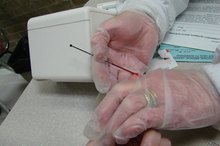The Effects of Alcohol on Enzymes
Your body produces thousands of types of metabolic and digestive enzymes. The foods you eat also supply you with enzymes. Enzymes converge with other substances in your body to speed up chemical reactions, making your body work at optimal levels. On a nutritional level, your body cannot metabolize or digest food without the help of enzymes. Alcohol consumption can change the efficiency with which your body breaks down foods and toxins, resulting in detrimental liver and health complications.
If you are experiencing serious medical symptoms, seek emergency treatment immediately.
Alcohol Metabolism
After you drink an alcoholic beverage, it is absorbed from your small intestine into the veins carrying blood to your stomach and bowels. During this process, ethanol, the active ingredient in alcohol, is dispersed to your brain, which activates the intoxicating effects. After your stomach and bowels complete absorption of alcohol, it is carried to your liver for further metabolic breakdown, where it is met by alcohol and aldehyde dehydrogenase enzymes. These two enzymes are responsible for breaking down the toxic properties of alcohol for later elimination from your body. Although the majority of alcohol is metabolized by your liver, a small percentage of alcohol is not, which constitutes the alcohol that reaches your brain with the help of the cytochrome enzymes and the catalase enzyme 3. These brain enzymes are involved in the oxidative metabolism of ethanol, notes Alcohol Research and Health 3. Oxidative metabolism of alcohol contributes to cell and tissue damage that impacts your brain functions.
- After you drink an alcoholic beverage, it is absorbed from your small intestine into the veins carrying blood to your stomach and bowels.
- After your stomach and bowels complete absorption of alcohol, it is carried to your liver for further metabolic breakdown, where it is met by alcohol and aldehyde dehydrogenase enzymes.
Liver Enzymes
Alcohol & Digestive Enzymes
Learn More
The enzymes most significantly impacted by alcohol consumption are found in your liver. Alanine transaminase and aspartate transaminase are similar enzymes prominent in your liver that become elevated when you drink alcohol. Gamma-glutamyltransferase is also a liver enzyme that increases from alcohol use. Laboratory testing of these enzymes can reveal if your alcohol use is causing any level of liver damage. A liver panel or liver function test conducted by your physician may be necessary if you have a history of alcohol abuse. However, the American Academy of Family Physicians notes that you may not have symptoms or signs of liver damage from alcohol use if you are in the early stages, which makes testing important if you overindulge in alcohol beverages.
- The enzymes most significantly impacted by alcohol consumption are found in your liver.
- Alanine transaminase and aspartate transaminase are similar enzymes prominent in your liver that become elevated when you drink alcohol.
Why Alcohol Is Harmful to Enzymes
In the simplest sense, alcohol consumption is harmful to your enzymes because the ethanol is a poison, or toxin, to your body. It takes a moderate amount of drinking to cause elevated liver enzymes and neurological enzyme damage. The majority of damage alcohol causes, however, is generally from chronic and excessive consumption. As a toxin, the repeated introduction of alcohol to your body can prevent your liver from efficiently filtering the waste created as a byproduct of alcohol consumption. The result of chronic damage to liver enzymes from alcohol use includes fatty liver, alcoholic hepatitis, fibrosis, cirrhosis and eventual death.
- In the simplest sense, alcohol consumption is harmful to your enzymes because the ethanol is a poison, or toxin, to your body.
Reversing Alcohol Damage
Elevated Liver Enzymes and Alcohol
Learn More
Your liver has the amazing ability to regenerate if the damage is not too progressed. This means if you alter your alcohol consumption, you can prevent alcoholic liver disease 1. Your brain may also suffer less, especially if you improve your nutrition habits along with quitting excessive alcohol use. Talk to your physician regarding your specific alcohol use habits and get your liver enzymes tested. Eat well-balanced and nutrient-rich meals to replace enzymes you destroy from alcohol use and consider dietary supplements with recommendations from your physician. If you're having difficulty reducing your alcohol consumption, consult your local health services office for resources available to help you quit drinking.
- Your liver has the amazing ability to regenerate if the damage is not too progressed.
- Your brain may also suffer less, especially if you improve your nutrition habits along with quitting excessive alcohol use.
Related Articles
References
- National Institute on Alcohol Abuse and Alcoholism: Alcoholic Liver Disease; January 2005
- American Academy of Family Physicians: Mildly Elevated Liver Transaminase Levels in the Asymptomatic Patient; Paul T. Giboney M.D.; March 15, 2005
- Alcohol Research and Health: Overview; How is Alcohol Metabolized by the Body?
- Resonance: The Biochemistry of Alcohol Toxicity
- National Institute on Alcohol Abuse and Alcoholism. Alcohol Metabolism: An Update. Alcohol Research & Health. 2007;30(1).
- Taylor B, Rehm J. The relationship between alcohol consumption and fatal motor vehicle injury: high risk at low alcohol levels. Alcohol Clin Exp Res. 2012;36(10):1827-34. doi:10.1111/j.1530-0277.2012.01785.x
- Ferré S, O'Brien MC. Alcohol and caffeine: The perfect storm. J Caffeine Res. 2011;1(3):153-162. doi:10.1089/jcr.2011.0017
- Stornetta A, Guidolin V, Balbo S. Alcohol-derived acetaldehyde exposure in the oral cavity. Cancers (Basel). 2018;10(1):20. doi:10.3390/cancers10010020
- Hadland SE, Levy S. Objective testing: Urine and other drug tests. Child Adolesc Psychiatr Clin N Am. 2016;25(3):549-65. doi:10.1016/j.chc.2016.02.005
- Stewart SH, Koch DG, Willner IR, Randall PK, Reuben A. Hair ethyl glucuronide is highly sensitive and specific for detecting moderate-to-heavy drinking in patients with liver disease. Alcohol Alcohol. 2013;48(1):83-7. doi:10.1093/alcalc/ags109
- Fillmore MT, Jude R. Defining "binge" drinking as five drinks per occasion or drinking to a .08% BAC: which is more sensitive to risk? Am J Addict. 2011;20(5):468-75. doi:10.1111/j.1521-0391.2011.00156.x
- American Association for Clinical Chemistry. Ethanol. 2018.
- Cederbaum A. Alcohol metabolism. Clinics in Liver Disease. 2012;16(4):667-685. doi:10.1016/j.cld.2012.08.002
- LabCorp, Inc. Drugs of Abuse Reference Guide. 2007.
- National Institute on Alcohol Abuse and Alcoholism. Alcohol Metabolism: An Update. Alcohol Research & Health. 2007;30(1).
Writer Bio
Aubri John has been a contributing researcher and writer to online physical and mental health oriented journals since 2005. John publishes online health and fitness articles that coincide with her licensed clinical skills in addictions, psychology and medical care. She has a master's degree in clinical social work and a Ph.D. in health psychology.









